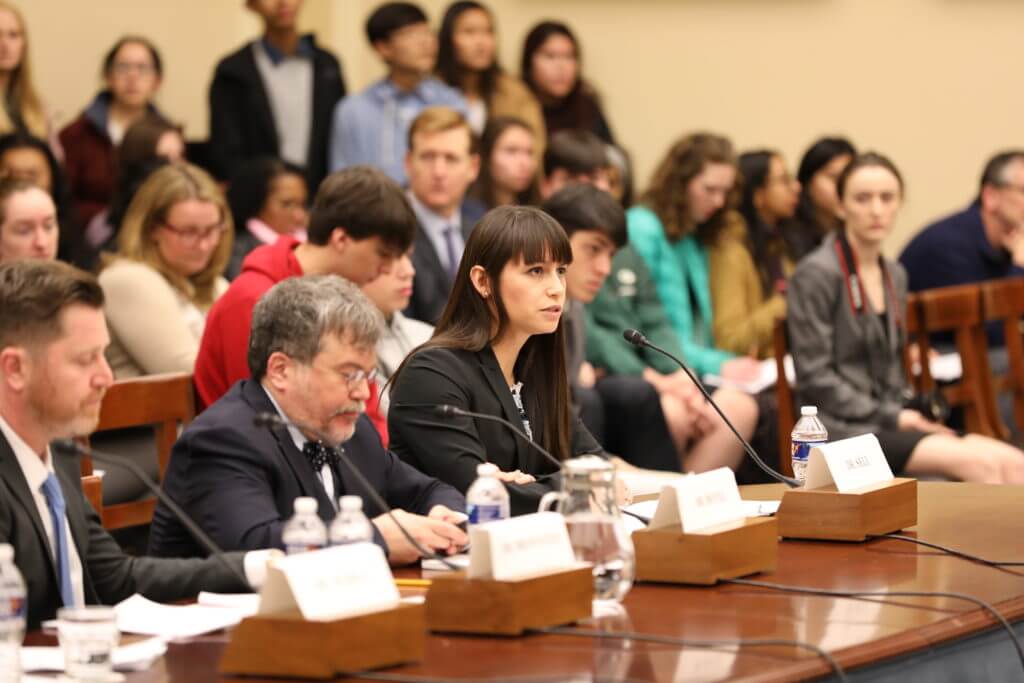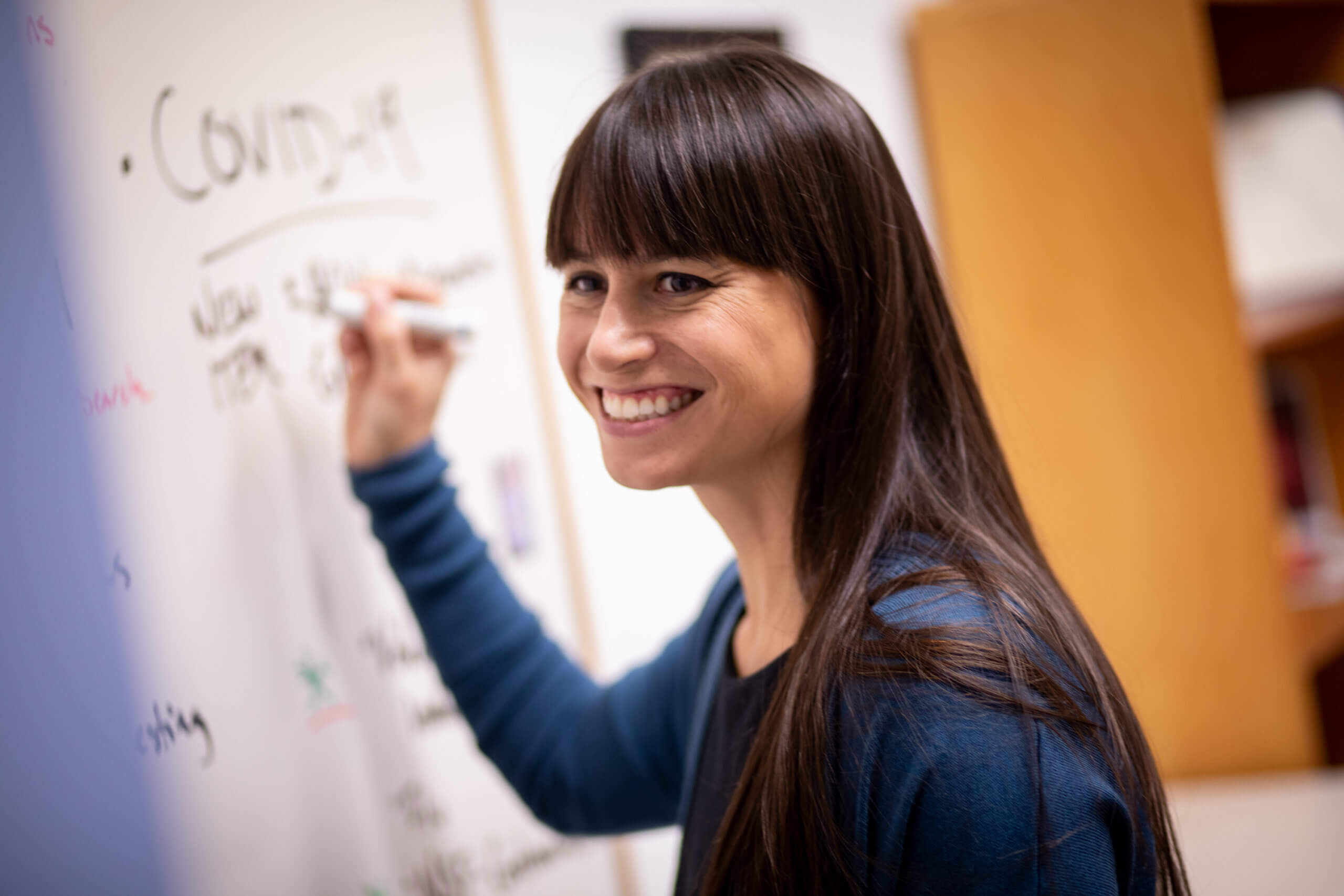Out of the Pool: Tara Kirk Sell on Communicating Risk During a Pandemic

Out of the Pool: Tara Kirk Sell on Communicating Risk During a Pandemic
When Tara Kirk Sell and her colleagues at Johns Hopkins University’s Center for Health Security convened in the fall of 2019 for an exercise, one of the questions the experts weighed was in how to make the lessons tangible and accessible outside of academia.
The exercise was called Event 201. It took place in the Oct. 2019, a day-long simulation of how to react in the event that a novel coronavirus created a severe global pandemic and mitigate its health and economic consequences. It was only a matter of months before the hypotheticality was stripped away, and Kirk Sell put research that she had just published in early 2020 about how the world reacted to the Ebola virus and Zika virus into practice to combat COVID-19.
To go from a New York board room to a world consumed by the deadly outbreak of COVID-19 was unusual. To study misinformation and see some of Kirk Sell’s own words being co-opted for disinformation purposes, that was even weirder.
“It was very meta,” Kirk Sell said.

Photo Courtesy: Tara Kirk Sell
It’s part of the job for Kirk Sell, the Olympian and swimming standout at Stanford who earned a Ph.D. in health policy and management from Hopkins’ Bloomberg School of Public Health in 2016. She’s now a senior scholar and assistant professor there. The silver medalist in the Athens Olympics in the women’s medley relay and a 13-time Worlds medalist has published a number of papers on public health preparedness. Her expertise includes biosecurity and biodefense as well as emerging infectious disease and nuclear consequence management, with a particular emphasis on how risk is communicated. She testified before the House of Representatives’ Science, Space, and Technology Committee in March 2020 and has become a go-to expert for many media outlets.
She recently chatted with Swimming World about what attracted her to this work, how the 2020 Tokyo Olympics were handled and how swimming at the Olympics is similar to testifying before Congress.
(Interview has been edited and condensed.)
SW: You picked a rigorous course of study at Stanford. What went into that choice?
Tara Kirk Sell: The human biology major at Stanford is challenging, but I think it’s really an interesting combination of fields, looking at what it means to be human. From the biological side to the social side, how those things go together to influence health is really interesting. I do think a lot of the women athletes at Stanford, many of them end up in human biology … (so) I don’t think it’s weird for Stanford athletes, especially women, to end up in human biology.
SW: I imagine a major like human biology can push you down many different career avenues. What was it that drew you to public health specifically?
TKS: My advisor taught a class called “Contagion and conflict,” and I learned about a really cool simulation or exercise called Dark Winter, which is a simulated smallpox attack on the U.S., and I just thought it was so interesting. It was led by my hero, D.A. Henderson, who was the man who led the program to eradicate smallpox from the world, and I was just really interested in it. And one day, I was thinking about what was the next thing I was going to do, I was having dinner with my now-husband’s roommate’s dad, and he said, ‘what are you going to do with your life, Tara?’ And I said, ‘well I don’t know but I think this is really interesting.’ And he said, ‘I know the people who wrote it.’
So he connected me with them, and it was off to the Center for Biosecurity, as it was known at the time – we’re now the Center for Health Security – but was working there, ended up getting my Ph.D. at Hopkins then continuing to work in the field of pandemic preparedness.
SW: It looks like you’ve had the chance to participate in a few exercises like Dark Winter in your career. What have those been like?
TKS: I worked on a couple different simulations or exercises. One was the SPARS exercise, and that was a scenario, a written thing. I co-led the Event 201 exercise in Oct. 2019, which was actually based around a coronavirus pandemic and we were trying to think about what are the different ways that we can galvanize interest and work in this field, and how can we get people to take it seriously. Little did we know that as we were doing that exercise, COVID was emerging in Asia and was going to be the center of all public health thought for the next couple of years.
SW: What does that feel like, to see work that you’ve done for so long be discovered in a new light, maybe by people thinking about pandemics for the first time?
TKS: It was interesting. It felt like, yeah we’ve worked on these things now for a long time and that’s why we have expertise and we can say, ‘here’s what we think is going to happen,’ and it’s generally accurate. Mixed into that, being the experts on call was also this strange misinformation narrative that seemed to indicate that somehow, because we had put a lot of thought into it and were accurate in thinking what the problems were that there was some sort of nefarious conspiracy behind it. I worked a lot on misinformation, and in fact, one-fourth of that exercise was focused on managing and dealing with misinformation that was circulating, so we knew that was going to be a problem as well. It was just kind of strange to be a researcher trying to figure out and understand misinformation, and then be featured in misinformation, and finding videos of myself in some of our datasets where we’re looking at misinformation. It was very meta.
SW: On the communication side, how has the challenge evolved with COVID specifically and how has your work evolved with it?
TKS: A lot of my work is on risk communication, and the sad thing about this pandemic has been that the communication component of it has been so poorly done. So you kind of think, oh geez, all those years and look where we are. And we know, and I’ve been trying to say for years, that we can have the best countermeasures out there – in fact, we have a great countermeasure in these vaccines – but it doesn’t work if people are too misled by rumor or falsehood to take it. And so I think that that has been an incredibly challenging part of this communication sphere to deal with the misinformation that is circulating. We have worked on misinformation and actually were publishing a piece looking back at Ebola in 2016 and the misinformation about that, right about at the start of this pandemic, so at least had a head start on trying to think about this. Now, everyone recognizes this as a problem, or many people recognize it as a problem – although there’s different opinions on who is misinformed. So I think this is something that is very clearly going to be an issue and an area that needs to be addressed going forward. We’ve seen the limitations of trying to just provide people with the right information and you need to provide people with information in a way that resonates with their values and beliefs and makes it so that it’s something they can accept rather than just throwing how you see it at them.
It was just kind of strange to be a researcher trying to figure out and understand misinformation, and then be featured in misinformation, and finding videos of myself in some of our datasets where we’re looking at misinformation. It was very meta.
SW: You’ve discussed the communication of risk in 2020 about how and when to restart normal activities like school and sports, and I wonder if given your background, you had any special insight on how the conversation around holding the Olympics last summer unfolded?
TKS: I think from a public-health perspective, the Olympics were actually a pretty great success. There were a lot of naysayers back at the beginning, and in fact even people who said it was immoral to have the Olympics, which I think was just people who didn’t understand what happens at the Olympics, which it’s a very controlled environment and where people are there to compete. So of course, the athletes are going to comply with the testing. As long as there were no bottlenecks, which fortunately there weren’t, with the testing in Japan, I was fairly confident that would work out. And it did. They recognized a number of cases as they came in to the country, and that’s what the testing system was designed to do. So they prevented those individual cases from becoming clusters or outbreaks. I think that was a big success. As an athlete, I know it was probably distracting and annoying and not something that athletes wanted to deal with, but certainly better than not having an Olympics at all.
SW: So you’ve been behind the blocks at the Olympics and you’ve testified before Congress. How do those two challenges compare?
TKS: When I was sitting back in the little room before you go out to go sit down to do your testimony, I was thinking, this is a lot like being in the ready room before your event. So there were a lot of similarities there. But I definitely think it’s much more nerve-wracking to be on the blocks before the Olympics or something like that than it is to get out there for testimony. Maybe it comes down to practice, you know what you’re going to do in the meet, you know what you’re going to do in your testimony, you know what you know. You worry about getting partisan attacks on the things that you’re saying, and I had one kind of weird set of questions. But you’re an expert in the field and that’s why you’re called there to testify and you just tell people what you think. I think probably a more contentious committee, it might have been a little bit more nerve-wracking, but I was happy to provide my expertise at Congress and hope that was helpful to them back in the early days of the pandemic.



